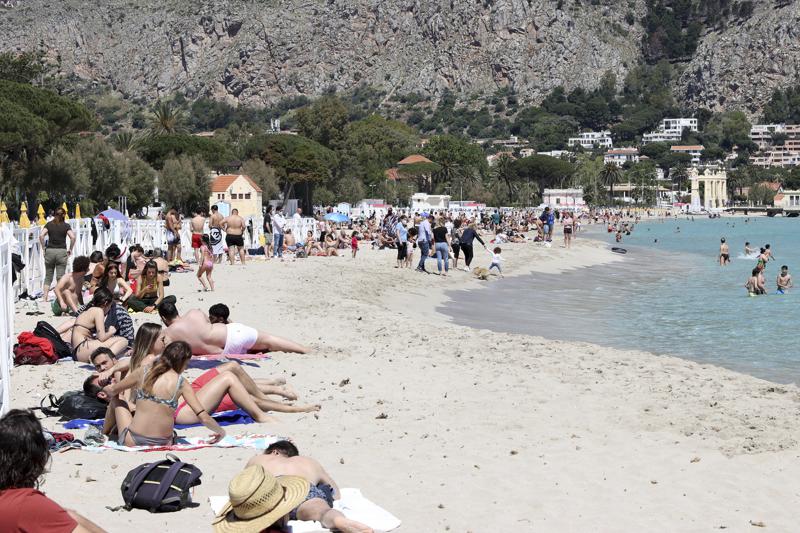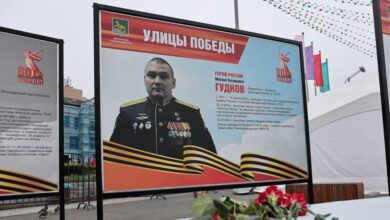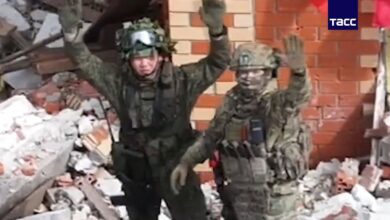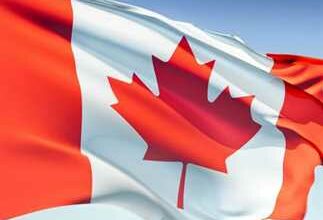
TORONTO — All adults in Canada’s most populous province will be eligible to book a COVID-19 vaccine starting Tuesday.
The Ontario government says those turning 18 this year will be allowed to book shots. The provincial government had initially said it would lower the vaccine eligibility age to 30 this week.
The province will also now send shots to regions on a per-capita basis, after two weeks of sending half the vaccine supply to COVID-19 hot spots.
Canada expects to get 3.5 million Pfizer and Moderna vaccines this week. More than 55% of the population in Ontario aged 18 and over have received at least one dose.
___
HERE’S WHAT ELSE IS HAPPENING:
AMSTERDAM — The European medicines regulator says it is safe to store thawed Pfizer vaccines in a regular fridge for up to 31 days, a ruling that will make handling the vaccine easier around the European Union.
The European Medicines Agency said Monday that its human medicines committee has recommended changing the storage guidelines for unopened, thawed vials of the Pfizer vaccine from five days to a month at normal fridge temperatures after they have been taken out of deep freeze.
The change came after Pfizer and BioNTech submitted “additional stability study data” to the Amsterdam-based agency.
The European Union agreed a massive contract extension for the Pfizer-BioNTech vaccine this month for a potential 1.8 billion doses through 2023.
___
ROME — The number of calls placed to Italy’s national domestic violence hotline increased nearly 80% last year in a sign that coronavirus-induced lockdowns created a “detonator” effect in already violent homes.
Italy’s national statistics agency issued a comprehensive report Monday on the requests for help last year to the hotline and shelters.
The report said the number of calls to the toll-free 1522 number and related texting option hit a peak in April and May, during the first wave of COVID-19, which hit Italy first in Europe. Another peak came around Nov. 25.
ISTAT said the data confirmed it was accurate to speak of a “double pandemic” — one that was epidemiological and one fueled by domestic violence.
___
NEW YORK — Target and CVS are the latest retailers to no longer require vaccinated shoppers or workers to wear a mask in its stores.
The announcement comes after the Centers for Disease Control and Prevention eased mask-wearing guidance for fully vaccinated people last week, allowing them to stop wearing masks outdoors in crowds and in most indoor settings. On Friday, Walmart, Costco and several other large retailers said that those who have been vaccinated don’t need to wear masks.
Target and CVS said Monday that they will still recommends those who aren’t vaccinated to wear masks in its stores. Target said it is offering paid time off to workers to get a COVID-19 vaccine.
___
ROME — The first European visitors have started arriving in Italy after the government lifted a coronavirus quarantine requirement for travelers from the European Union, Britain and Israel.
People arriving on a flight Monday from Greece had to test negative before boarding. Among the passengers was Greek tourist Aris Mandatakis, who said the no-quarantine rule was great. He said it was just like being “a normal person.”
Italy announced last week it was relaxing its COVID-19 quarantine requirement for visitors from the EU, Israel and Britain in a bid to jumpstart its pandemic-devastated tourist industry.
Italy had imposed the five-day quarantine on EU travelers to deter visitors over the Easter holiday and to discourage Italians from taking advantage of a loophole that had made it easier to travel abroad than from Rome to Milan.
Italy, where the coronavirus outbreak first erupted in Europe, has seen its confirmed caseload fall to fewer than 10,000 a day after a winter of lockdowns and an accelerating vaccination campaign. The country though is still seeing around 200 deaths a day, and has the second-highest confirmed COVID-19 toll in Europe after Britain.
___
HONG KONG — Hong Kong authorities said Monday that quarantine restrictions for arrivals from countries like Singapore, Japan and Malaysia would be tightened beginning Friday amid a surge in coronavirus infections
From Friday, unvaccinated travelers from “high-risk” countries including Argentina, Italy, Japan, Kenya, Malaysia, the Netherlands and Singapore will have to serve 21 days in a designated hotel in Hong Kong and undergo four coronavirus tests.
Vaccinated travelers from these countries will undergo quarantine for 14 days in a designated hotel and have to take three coronavirus tests. They are also required to self-monitor and take further coronavirus tests on their 16th and 19th days of arrival.
All travelers from these countries must also present a negative coronavirus test within 72 hours of their scheduled flight to Hong Kong.
Hong Kong so far has had a slower-than-expected vaccination rate of about 16% of its population.
___
KENAI, Alaska — Alaska public health officials say nearly half of the state’s residents 16 and older have been fully vaccinated against COVID-19.
The Peninsula Clarion reports about 47% of people 16 and older had received both doses as of Friday, while about 53% had received at least one dose.
The milestones came days after Alaska opened up vaccination appointments for children 12 and up following the U.S. Center for Disease Control and Prevention approval of Pfizer and BioNTech’s COVID-19 vaccine for use in the age group.
___
THE HAGUE, Netherlands — The Dutch government will further relax the nationwide coronavirus lockdown on Wednesday, allowing zoos and theme parks to reopen.
The government said Monday that falls in hospital admission numbers of COVID-19 patients allowed the easing to go ahead.
Bars and cafes can also extend the opening hours of their outdoor terraces under strict conditions. Libraries will reopen on Thursday, though visitors will have to make a reservation and complete a health check.
The 7-day rolling average of daily new cases in the Netherlands has declined over the past two weeks from 40 to 32 cases per 100,000 people.
___
TOKYO — Dozens of protestors on Monday took one of Tokyo’s busiest streets and called for the cancellation of the Summer Olympics, which Japan is determined to host despite a resurgence of coronavirus infections.
With the number of hospitalized patients close to record-high levels, along with a slow vaccine rollout, more people in Japan are feeling uneasy about the prospect of carrying out the world’s biggest sports event in just 10 weeks.
The rally was originally planned as a protest to International Olympic Committee President Thomas Bach’s cancelled May 17-18 visit to Japan.
“Medical workers in Japan are all exhausted, and there is no guarantee that the Olympics could be held safely,” Keiko Nakamori, a 65-year-old protester, said outside Shimbashi station.
A survey published Monday by the Asahi newspaper showed more than 80% of 1,527 respondents said the Olympic Games should be canceled or further postponed.
___
COLOMBO, Sri Lanka: Sri Lankan authorities on Monday allowed shops and public transport to reopen, easing a three-day travel restriction imposed across the country.
Sri Lankans were prohibited from leaving their homes since Thursday night to try to contain the spread of COVID-19. But authorities said those restrictions will now be imposed for five hours overnight for the next two weeks.
In addition, for the next two weeks, only one person from each household is permitted to leave the house. Authorities have banned all public gatherings, weddings, cinemas, parties, bars, musical shows and closed schools and universities.
___
MADRID — Spain is sending a plane to Nepal to pick up and bring home some 40 Spanish mountaineers, aid workers and others who have been affected by the travel bans imposed amid high coronavirus infection rates there.
Foreign Minister Arancha González Laya said Monday that the plane will also take ventilators and other medical supplies to Nepal to treat patients with COVID-19.
The mountaineers had called on authorities to repatriate them, a move met with criticism from those who said a pandemic is not a time to travel abroad to climb Mount Everest or other major Himalayan peaks.
Nepal is experiencing a coronavirus surge with record numbers of new infections and deaths. Authorities imposed a lockdown across most of the country last month and have extended it until the end of May.
China has also cancelled attempts to climb Mount Everest from its side because of fears of importing COVID-19 cases from Nepal.
___
LONDON — Pubs and restaurants across much of the U.K. opened for indoor service for the first time since early January on Monday, even as the prime minister urged people to be cautious amid the spread of a more contagious COVID-19 variant.
The latest step in the gradual easing of nationwide restrictions imposed on Jan. 4 also includes the reopening of theaters, sports venues and museums, raising hopes that the economy may soon start to recover from the devastating effects of the pandemic. The government is also relaxing guidance on close personal contact, such as hugging, and permitting international travel, though only 12 countries and territories are on the list of “safe” destinations.
But the rapid spread of a variant first discovered in India is tempering the optimism amid memories of how another variant swept across the country in December, triggering England’s third national lockdown. Public health officials and the government are urging people to continue to observe social distancing, even though they say the situation is different now because almost 70% of the adult population has received at least one dose of vaccine.
“Please, be cautious about the risks to your loved ones,” Prime Minister Boris Johnson said in a video posted on Twitter. “Remember that close contact such as hugging is a direct way of transmitting this disease.″
Britain has Europe’s highest coronavirus death toll, at some 128,000 people.
___
JOHANNESBURG, South Africa — South Africa has started its mass vaccination drive with the goal of inoculating nearly 5 million citizens 60 and over by the end of June.
Shots of the Pfizer vaccine were given to South Africans on Monday to start the campaign.
So far the country has inoculated just over 478,000 of its health care workers with the Johnson & Johnson vaccine and it plans to give the shots to the remainder of its 1.2 million health workers this week.
South Africa has nearly 1 million doses of the Pfizer vaccine, after receiving a delivery of 325,260 doses on Sunday night.
South Africa’s vaccination drive comes as the country is seeing a rise in COVID-19 cases and experts warn of a resurgence as the country approaches the Southern Hemisphere’s winter.
___
LISBON, Portugal — British vacationers have started arriving in Portugal after the U.K. and Portuguese governments eased their COVID-19 pandemic travel restrictions.
A flight from Manchester, England, arrived early Monday in Faro, the main city in Portugal’s southern Algarve tourist region. More than 5,000 British visitors were expected to arrive in Portugal on 17 flights during the day.
That has brightened the outlook for Portugal’s crucial tourism sector, which relies heavily on the U.K. market and which shut down for most of the past year.
Both Portugal and the United Kingdom have reduced their seven-day rolling average of new COVID-19 cases per 100,000 people to between 3 and 4.
The U.K. government has put Portugal and 11 other countries on a so-called Green List of low-risk territories. British people returning home from those areas do no need to go into a 10-day quarantine.
Beginning Monday, Portugal allowed nonessential travel from all but five European countries.
___
JIDDAH, Saudi Arabia — Vaccinated Saudis will be allowed to leave the kingdom for the first time in more than a year on Monday as the country eases a ban on international travel aimed at containing the spread of the coronavirus and its new variants.
For the past 14 months, Saudi citizens have mostly been banned from traveling abroad out of concerns that international travel could fuel the outbreak of the virus within the country of more than 30 million people. The ban, in place since March 2020, has impacted Saudi students who were studying abroad, among others.
In recent months, however, the kingdom has vaccinated close to 11.5 million residents with at least one jab of the COVID-19 vaccine, making them eligible to depart the country Monday under the new guidelines. Authorities will also allow people who have recently recovered from the virus and minors under 18 with travel insurance to travel abroad.
Travelers returning from abroad will be required to quarantine at home and be tested for the virus.
___
DUBAI, United Arab Emirates — Dubai has announced the relaxation of coronavirus restrictions as its vaccinations accelerate, allowing live concerts, weddings and sporting events to resume for those vaccinated against COVID-19.
In a statement Monday, the city-state in the United Arab Emirates said it was giving the green-light to concerts, weddings, sports matches and other big events, provided that the spectators, attendees and staff are all vaccinated.
The announcement was the first indication that the reopening of Dubai, the region’s major financial hub that depends heavily on tourism, aviation and retail, may be conditioned on vaccination.
Dubai also said indoor events could resume for a maximum of 1,500 people and outdoor events for 2,500. Hotels would be able to operate at full capacity and restaurants and coffee shops to seat 10 per table instead of six.
The UAE has boasts among the fastest vaccination campaigns in the world, relying mostly on the Chinese state-backed Sinopharm vaccine.
___
HONG KONG — Hong Kong’s government says the start of a proposed quarantine-free travel bubble with Singapore has been postponed following a spike in untraceable cases in the Southeast Asian city state.
A news release Monday said the two governments had decided to defer the start of the air travel bubble originally slated for May 26 “in view of the recent COVID-19 epidemic situation in Singapore.”
It said both governments remained committed to the bubble and would continue to closely monitor developments in both places. Stepped-up anti-epidemic measures that took effect in Singapore on Sunday are due to run through June 13.
The announcement came after Singapore restricted gatherings to just two people and limited restaurants to delivery or takeout service only.
The number of new cases has risen to 71 in the past week, from 48 the week before, as infections rise from a cluster tied to Changi Airport. Infections not linked to identified cases have risen to 15 in the last week, more than double the week before.
___
NEW DELHI — For the first time in weeks, India’s daily cases dropped below 300,000, continuing a decline as the country battles a ferocious surge of COVID-19.
The health ministry said around 280,000 cases and 4,106 deaths were confirmed in the last 24 hours. Both numbers are almost certainly undercounts.
India’s overall vaccination efforts are also struggling. Ever since the country opened vaccinations to all adults this month, the pace of administering doses has plunged, with many states saying they don’t have enough stock to give out. Over the last month, cases have tripled and deaths have jumped by six times — but vaccinations have dropped by 40%.
The southern state of Karnataka has suspended vaccinations for the 18-44 age group in government-run centers, and a number of states are looking into directly getting shots from overseas to fill a domestic shortage. On Sunday, health officials said around 5 million doses will be sent to the states this week.
India has the second-highest caseload after the U.S. with more than 24 million confirmed infections and over 270,000 fatalities.
___
BEIJING — China is instituting new controls in a northeastern province where several new cases of COVID-19 are believed to have originated.
China on Monday reported five new cases of local transmission, all in Liaoning province or believed to be linked to its cases.
Checkpoints were set up at toll stations, airports and railway stations in three cities in Liaoning and travelers must have proof of a recent negative virus test, according to state media on Monday. Mass testing was ordered in part of Yingkou, a port city with shipping connections to more than 40 countries.
China had largely stamped out domestic transmission of the coronavirus through restrictions on the public, contact tracing, mass testing and, increasingly, vaccinations.
China has reported 4,636 deaths since the virus was detected in Wuhan in late 2019.




